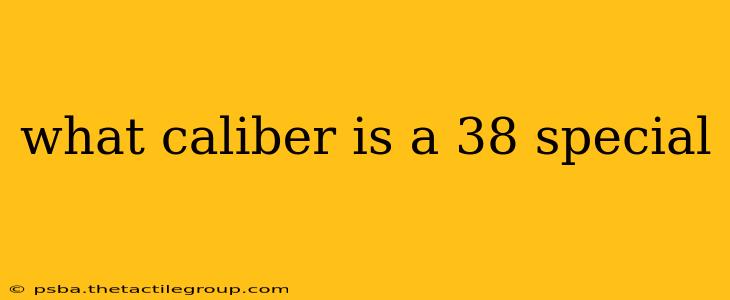The .38 Special is a .38 caliber cartridge. However, it's crucial to understand that the ".38" designation isn't just about the bullet diameter. The complexity lies in the relationship between the bullet's diameter, the case's dimensions, and the resulting ballistics. Let's delve deeper.
Deciphering the .38 Caliber: More Than Just a Number
While the bullet diameter of a .38 Special is approximately 0.357 inches (hence the occasional confusion with the .357 Magnum), the ".38" designation historically refers to the bore diameter of the revolver barrels it was designed for. Early measurements were less precise than modern standards, leading to some inconsistencies.
Key Aspects of the .38 Special:
- Bullet Diameter: Approximately 0.357 inches. This is the actual diameter of the bullet itself.
- Case Dimensions: The .38 Special cartridge has specific case length and width dimensions that differentiate it from other .38 caliber rounds. This is critical, as using the wrong ammunition in a firearm can be incredibly dangerous.
- Ballistics: This encompasses factors like muzzle velocity, energy, and trajectory. The .38 Special's ballistics vary depending on the bullet weight, powder load, and the firearm used. Generally, it's considered a relatively low-recoil cartridge, making it suitable for both target shooting and personal defense.
Comparing the .38 Special to other .38 Caliber Rounds:
Several cartridges share the ".38" nomenclature, but they are not interchangeable. The .38 Special is distinct from rounds like the .38 Long Colt and the .38 S&W. These rounds differ significantly in case length and powder capacity, making them incompatible with firearms designed for the .38 Special. Using incorrect ammunition can cause serious damage to the firearm and lead to injury.
Understanding the Differences is Crucial:
Always double-check the markings on your firearm to ensure you are using the correct ammunition. Never assume that a ".38" cartridge will fit your weapon. The consequences of such an assumption can be severe.
Beyond the Caliber: Choosing the Right Ammunition
The .38 Special offers a range of bullet types and weights, each impacting its performance. The choice of ammunition depends on the intended use:
- Target Shooting: Typically, less expensive, full metal jacket (FMJ) bullets are used.
- Self-Defense: Hollow point (HP) or jacketed hollow point (JHP) bullets are commonly chosen for their expanded stopping power.
Consulting with experienced shooters or firearms professionals is highly recommended for selecting the appropriate ammunition for your specific needs and firearm.
Conclusion:
While the .38 Special is indeed a .38 caliber round, the term encompasses more than just bullet diameter. Understanding case dimensions, ballistics, and the differences between various ".38" cartridges is vital for safe and responsible firearm handling. Always prioritize safety and consult reliable sources before handling any firearm or ammunition.

